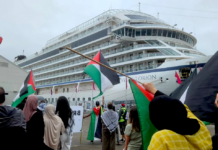COMMENTARY: By Laurens Ikinia in Jakarta
Pope Francis has completed his historic first visit to Southeast Asian and Pacific nations.
The papal apostolic visit covered Indonesia, Papua New Guinea, Singapore and Timor-Leste.
This visit is furst to the region after he was elected as the leader of the Catholic Church based in Rome and also as the Vatican Head of State.
Under Pope Francis’ leadership, many church traditions have been renewed. For example, he gives space to women to take some important leadership and managerial roles in Vatican.
Many believe that the movement of the smiling Pope in distributing roles to women and lay groups is a timely move. Besides, during his term as the head of the Vatican state, the Pope has changed the Vatican’s banking and financial system.
Now, it is more transparent and accountable.
Besides, the Holy Father bluntly acknowledges the darkness concealed by the church hierarchy for years and graciously apologises for the wrong committed by the church.
The Pope invites the clergy (shepherds) to live simply, mingling and uniting with the members of the congregation (sheep).
The former archbishop of Buenos Aires also encourages the church to open itself to accepting congregations who identify as lesbian, gay, bisexual, and transgender (LGBT).
However, Papa Francis’ encouragement was flooded with protests from some members of the church. And it is still an ongoing spiritual battle that has not been fully delivered in Catholic Church.
Two encyclicals
Pope Francis, the successor of Apostle Peter, is a humble and modest man. Under his papacy, the highest authority of the Catholic Church has issued four apostolic works, two in the form of encyclicals, namely Lumen Fidei (Light of Faith) and Laudato si’ (Praise Be to You) and two others in the form of apostolic exhortations, namely Evangelii Gaudium (Joy of the Gospel) and Amoris Laetitia (Joy of Love).
Of the four masterpieces of the Pope, the encyclical Laudato si’ seems to gain most attention globally.
The encyclical Laudato si’ is an invitation from the Holy Father to human beings to be responsible for the existence of the universe. He begs us human beings not to exploit and torture Mother Nature.
We should respect nature because it provides plants and cares for us like a mother does for her children. Therefore, caring for the environment or the universe is a calling that needs to be responded to genuinely.
This apostolic call is timely because the world is experiencing various threats of natural devastation that leads to natural disasters.
The irresponsible and greedy behaviour of human beings has destroyed the beauty and diversity of the flora and fauna. Other parts of the world have experienced and are experiencing adverse impacts.
This is also taking place in the Pacific region.
Sinking cities
The World Economy Forum (2019) reports that it is estimated there will be eleven cities in the world that will “sink” by 2100. The cities listed include Jakarta (Indonesia), Lagos (Nigeria), Houston (Texas-US), Dhaka (Bangladesh), Virginia Beach (Virginia-US), Bangkok (Thailand), New Orleans (Louisiana-US), Rotterdam (Netherlands), Alexandra (Egypt), and Miami (Florida-US).
During the visit of the 266th Pope, he addressed the importance of securing and protecting our envirinment.
During the historic interfaith dialogue held at the Jakarta’s Istiqlal Mosque on September 5, the 87-year-old Pope said Indonesia was blessed with rainforest and rich in natural resources.
He indirectly referred to the Land of Papua — internationally known as West Papua. The message was not only addressed to the government of Indonesia, but also to Papua New Guinea.
The apostolic visit amazed people in Indonesia which is predominantly a Muslim nation. The humbleness and friendliness of Papa Francis touched the hearts of many, not only Christians, but also people with other religious backgrounds.
Witnessing the presence of the Pope in Jakarta firsthand, we could certainly testify that his presence has brought tremendous joy and will be remembered forever. Those who experienced joy were not only because of the direct encounter.
Some were inspired when watching the broadcast on the mainstream or social media.
The Pope humbly made himself available to be greeted by his people and blessed those who approached him. Those who received the greeting from the Holy Father also came from different age groups — starting from babies in the womb, toddlers and teenagers, young people, adults, the elderly and brothers and sisters with disabilities.
Pope brings inner comfort
An unforgettable experience of faith that the people of the four nations did not expect, but experienced, was that the presence of the Pope Francis brought inner comfort. It was tremendously significant given the social conditions of Indonesia, PNG and Timor-Leste are troubled politically and psychologically.
State policies that do not lift the people out of poverty, practices of injustice that are still rampant, corruption that seems endemic and systemic, the seizure of indigenous people’s customary land by giant companies with government permission, and an economic system that brings profits to a handful of people are some of the factors that have caused disturbed the inner peace of the people.
In Indonesia, soon after the inauguration on October 20 of the elected President and Vice-President, Prabowo Subianto and Gibran Rakabuming Raka, the people of Indonesia will welcome the election of governors and deputy governors, regents and deputy regents, mayors and deputy mayors.
This will include the six provinces in the Land of Papua. The simultaneous regional elections will be held on November 27.
The public will monitor the process of the regional election. Reflecting on the presidential election which allegedly involved the current President’s “interference”, in the collective memory of democracy lovers there is a possibility of interference from the government that will lead the nation.
Could that happen? Only time will tell. The task of all elements of society is to jointly maintain the values of honest, honest and open democracy.
Pope Francis in his book, Let Us Dream, the Path to the Future (2020) wrote:
“We need a politics that can integrate and dialogue with the poor, the excluded, and the vulnerable that gives people a say in the decisions that impact their lives.”
Hope for people’s struggles
This message of Pope Francis has a deep meaning in the current context. What is common everywhere, politicians only make sweet promises or give fake hope to voters so that they are elected.
After being elected, the winning or elected candidate tends to be far from the people.
Therefore, a fragment of the Holy Father’s invitation in the book needs to be a shared concern. The written and implied meaning of the fragment above is not far from the democratic values adopted by Indonesia and other Pacific nations.
Pacific Islanders highly value the views of each person. But lately the noble values that were well-cultivated and inherited by the ancestors are increasingly diminishing.
Hopefully, the governments will deliver on the real needs and struggles of the people.
“Our greatest power is not in the respect that others have for us, but the service we can give others,” wrote Pope Francis.
Laurens Ikinia is a lecturer and researcher at the Institute of Pacific Studies, Indonesian Christian University, Jakarta, and is a member of the Asia Pacific Media Network (APMN).
Article by AsiaPacificReport.nz






